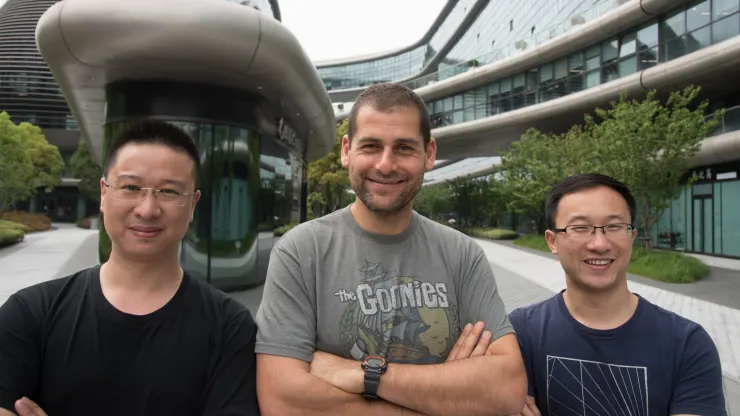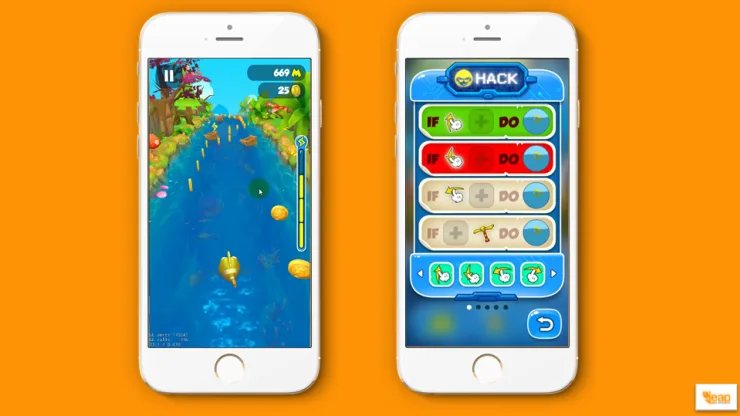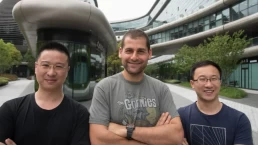This Chinese-Israeli start-up wants to change the way kids learn to code
LeapLearner, a Shanghai-based education start-up, aims to teach children as young as five years old how to code and then some.
The start-up’s main service might be a platform that educates children on programming, but its ultimate goal is to impart skills needed in the future to children, LeapLearner’s co-founder and CEO Ami Dror told CNBC in an exclusive interview.

“Coding is just a tool,” Dror said, adding that he sees the learning process of coding as instrumental to teaching children how to innovate and problem-solve.
Dror, a fellow at the Aspen Institute-linked Aspen Global Leadership Network, taught himself to code as a child. The entrepreneur was head of security for an Israeli prime minister and dabbled in the consumer 3D space in the past. Also part of LeapLeaner’s founding team are Aaron Tian, a popular mathematics tutor in China, and Leo Zhao.
There are around fifty people working at LeapLearner, Dror told CNBC. Half of that team have backgrounds in gaming and focus on the technological aspects of the start-up, while another team focuses on the educational side of the business.
The edutainment start-up also counts several illustrious names among its backers. Dror said that Honeywell President for Global High Growth Regions Shane Tedjarati and former Alibaba CTO John Wu are among early stage investors in the company.
It was Wu, who acts in the capacity of an adviser, that convinced him to launch LeapLearner in China, Dror said. Wu also ensures that what the start-up does is scalable in changing the way people learn, Dror added.
Combining a series of online and offline platforms, LeapLearner works on a cycle that involves three weeks of self-learning followed by a hackathon.
During the first three weeks, children learn aspects of coding on their own at home. First, children are exposed to code used in games they play by being allowed to change variables in the code of those games. For example, in a game like Pac-Man, children can “hack” the game by switching up the ways characters appear on the screen: pac-dots could be changed into bananas and Pac-Man could turned into a pet dog.

Once they understand variables, the children move on to practicing through natural language programming 一 a way of programming in the style of human language. When the child has mastered that, they move on to the coding platform itself, where they get to code with Java Script.
After the self-learning process is complete, the children gather in the fourth week for a hackathon where they meet other LeapLearner users in person and compete in teams to create games of their own.
In Dror’s words: “It’s not a game 一 it’s an educational platform.”
Besides the offline aspect of learning, LeapLearner differs from existing players in the coding education space because of how it is tailor-made to sustain engagement among children.
Some platforms, such as the Massachusetts Institute of Technology-developed Scratch — which uses blocks instead of words to allow users to program — make it easy to get kids involved in basic coding, but children stop using it when coding becomes more advanced, Dror said.
“It’s like learning engineering with Lego,” he added.
On the other hand, offerings from institutions like the Khan Academy can be too dull for younger users.
“The problem with Khan and Codeacademy is that the kids’ engagement is very low as both companies teach how to code with classroom-like tasks,” Dror said, adding that LeapLearner circumvents this by by teaching children through the process of developing video games.
For now, LeapLearner will only be launching in Shanghai, before being rolled out across greater China and Asia Pacific. Dror said the start-up will subsequently expand to the Middle East and South American markets as investments in education in those regions are high and demand for innovative, high quality educational products is strong.
The Beta version of LeapLearner will be available on April 25, while the platform opens to the public in Shanghai on June 1. Dror said that he is targeting 5,000 users in Shanghai before rolling LeapLearner out to the rest of China.
As for its pricing model, Dror said users would pay an annual “tuition” fee, of which there are several price levels to choose from. Pricing would be “more like school tuition … and less like buying an online service,” he added.
LeapLearner has currently secured $5 million in seed funding, of which 10 percent comes from Zaitoun Ventures, an Israeli-Palestinian investment firm that Dror co-founded.
While he preferred not to disclose LeapLearner’s target for its next round of funding, Dror noted that the start-up was looking at a “big round” for the end of the year.

